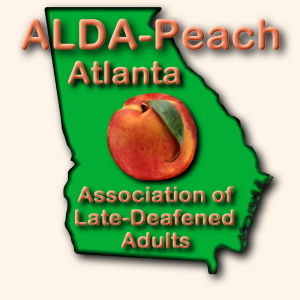|
Survivor Guide ALDA-Peach The Atlanta chapter of the Association of Late-Deafened Adults |
Essentials
š
š
š
š
š
Americans With Disabilities (ADA)
š
š
š
š
š
š
š
|
|
now we know what doesn’t work . . . |
A Survivor’s Guide for the Deafened Adults
A popular presentation at one of our monthly meetings covered the topic:
Traveling While Deaf: Handling Speed Bumps Along the Road to a More Accessible World!
A Travel Guide has been prepared containing the information from this presentation. Several questions were raised at the meeting and those answers have been incorporated into this travel guide.
You can view our Travel Guide (pdf) here: Traveling_While_Deaf.pdf
This travel guide was prepared by Tim Cheek, a SNG-certified travel agent who has over 20 years’ experience as a front desk clerk, hotel general manager, accountant, corporate operations staffer, and travel agency owner. Tim is always open to questions and discussing travel options with anyone. He especially welcomes all inquiries concerning accessible travel.
Tim can be reached at: Tim.Cheek@signsoftravel.com
Did you know YOUR television has closed captions? Sometimes there is a “cc” button on the t.v. or the remote. Sometimes you have to go to menu and arrive at CC-1. Many commercials are not captioned so be sure you are on a program. Also, it sometimes takes a few “seconds” for the captions to begin. In 1990, the FCC passed the Television Decoder Circuitry Act. ALL televisions that are 13” and larger MUST have captions.
You can find more information about captioned television at:
www.fcc.gov/cgb/consumerfacts/closedcaption.html
You can find a guide to closed captioning technology at:
http://www.vicaps.com/guide-to-closed-captioning-technology.php
You too, can enjoy (?!) Jerry Springer! or the evening news!
š
By February of 2009, all televisions will make the switch to HDTV. Unfortunately, the “switch” does not seem to be going smoothly for those who use captions. Often salespersons show a DVD which is not captioned and they are not trained to assist customers who need this. We have heard some stories where all worked well and some where all did not work! The televisions do have the “decoder chip” which makes captions but there is some problem with reception.
You can find more information about HDTV closed captioning on a CNET forum at:
http://forums.cnet.com/7723-7596_102-335195/confused-about-closed-captioning-and-hdtv/
š
Think you can never go on a cozy date at the movies again? WRONG!
Many of the theaters now have captioning and/or assisted listening devices!
CaptionFish provides a list of theaters and showtimes (use link at top/right to specify your location):
Regal Theaters mentions their policy and way to confirm captioning at a specific theater at:
www.regmovies.com/Theatres/Captioning-and-Descriptive-Video
AMC Theaters mentions their policy and way to confirm captioning at a specific theater at:
www.amctheatres.com/corporate/accessibility
A list of theaters using the "MoPix" (Motion Picture Access) system can be found at:
ncam.wgbh.org/mopix/locations.html#ga
š
Americans With Disabilities Act (ADA)
The Americans With Disabilities Act: The ADA mandates support services to all people with hearing loss. A good primer is "A Guide to Disability Rights Laws" which can be found at:
There are many other useful documents for employees, employers and the public available at:
disabilitylawcenter.org/dlc-publications/
Concerned about maintaing/getting a new job? “Google” ADA.
Want to be sure your hotel has flashing alarms? “Google” ADA.
Want to know your rights for understanding emergencies as posted on television? “Google” ADA.
There is a wealth of information on the internet.
Better yet, come to an ALDA-Peach meeting and see if someone else has a similar question!
š
The loss of telephone access is one of the most frustrating for deafened adults. However, there are a wide variety of options. We have to admit, we do not have the ease of carrying a cell phone and chatting all the time, but there are good options.
Check out our sponsor, Hamilton Relay, who is the current provider of Georgia Relay services.
There are varied ways of talking on the phone and reading what the other person is saying. Many deafened people have Blackberries or Sidekicks and use text messaging. Video relay is becoming more popular where you can SEE the person you are talking to on your computer or television set. Come to an ALDA-Peach meeting and you will learn how many of us use the phone in different ways.
š
ALDA’s communication philosophy is “whatever works!” Some of us use sign language, some of us don’t. Some have hearing aids or cochlear implants. Some require written communication. Some are able to speechread. We are committed that no one will be left out due to their hearing loss. And we ask that you be equally as patient with other ALDAns.
š
CART (Communication Access Real-Time Translation)
Communication Access Realtime Translation (CART) is a word-for-word speech-to-text interpreting service for people who need communication access. Unlike computerized notetaking or abbreviation systems, which summarize information for consumers, CART provides a complete translation of all spoken words and environmental sounds, empowering consumers to decide for themselves what information is important to them. CART consumers include people with hearing loss; individuals with cognitive or motor challenges; anyone desiring to improve reading/language skills; and those with other communication barriers.
The Americans with Disabilities Act (ADA) specifically recognizes CART as an assistive technology that affords effective communication access.
A CART provider supplies instant speech-to-text translation on a computer monitor or other display for the benefit of an individual consumer or larger group in a number of settings: classrooms; business, government, and educational functions; courtrooms; religious, civic, cultural, recreation, or entertainment events. A CART provider is sensitive to the varying needs of consumers and has had training in conveying a speaker’s message, complete with environmental cues. This expertise distinguishes a CART provider from a court reporter in a traditional litigation setting.
Attainment of certification so that an individual’s skills and knowledge can be examined objectively is strongly recommended. NCRA’s Certified CART Provider (CCP) designation is a nationally recognized standard. The CCP combines a written knowledge test and a skills exam focused on the requirements demanded of a competent CART provider. Other exams that may be relevant to judging an individual’s capability to perform the required work are the Certified Realtime Reporter (CRR) and Registered Professional Reporter (RPR) designations. Although both the CRR and RPR also incorporate written knowledge and skills exams, neither tests an individual’s knowledge of or capacity to provide CART with the specificity offered by the CCP exam.
You can find more information about CART services at:
www.nad.org/issues/technology/captioning/cart
(Thanks to Judy Brentano, former president of NCRA for this information)
š
Remote Captioning - (you can think of this as remote CART)
Remote captioning is a more affordable version of CART because the captioner is not physically present at your site.
-
You transmit a live audio feed to a captioner via the Internet to a remote site.
-
You receive the captioned text generated by the captioner on your computer via the Internet.
ALDA-Peach frequently uses remote captioning. You can find out more about our solution at:
www.aldapeach.org/remotecaptioning
You can find more information about Remote Captioning at:
www.hearinglink.org/remote-captioning
š
“Google” assistive listening devices for deaf/hard of hearing people and you will find an array of vendors. We do have a bias in support of www.ttyweb.com as they have been Peach supporters since the beginning. There are various devices that will flash for telephones, doorbells, babies crying, alarm clocks and so on.
š
ALDA’s own Cheryl Heppner has just published a great article on her service dog, Galaxy.
You can find more information about service dogs at:
THANKS for sharing, Cheryl!
š

